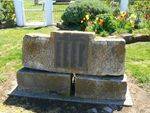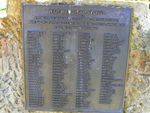
Home » Themes » Conflict » World War One
War Memorial AvenuePrint Page 
The Avenue of Honour commemorates those who served in World War One. The original avenue of trees was removed in the early 1990`s due to the age and size of the trees. The species chosen as a replacement was Claret Ash. There are no individual nameplates attached to the replacement trees.
Bothwell’s Avenue of Honour
Premier Plants First Tree
Impressive Ceremony
Bothwell, July 3.
The ceremony of planting the first tree in Bothwell’s Avenue of Honour took place this afternoon in the presence of a large and representative attendance. The proceedings opened with the National Anthem by the Bothwell Band.The Warden (Mr. A A Reid) explained that the Avenue was being planted as a fitting memorial to those brave men who had risked their all for King and country. One tree would be planted for every man enlisted from the district with the name, rank and unit inscribed on a copper plate on each tree guard. He was pleased indeed, that the avenue was an accomplished fact, and that in years to come they would have something to show what their soldiers had done. He introduced the Premier (Hon W H Lee) and thanked him for his attendance.
The Premier said it gave him very great pleasure to take part in the ceremony of planting the first tree in the Memorial Avenue to Bothwell soldiers. The people were to be congratulated on the very high spirit which prompted them to perpetuate the memory of the men who had answered the call of King and country. Bothwell had done remarkably well in the number of men, 108 to date, but he was sorry to see that the percentage of casualties was somewhat heavy: 27 brave fellows had made the supreme sacrifice, which tinged the ceremony with sadness. They had laid down their lives for the great principle for which the Empire and the Allies were fighting, and all ought to be thrilled with gratitude to these men and ever honour their memory. One of the finest things was the magnificent spirit of self-sacrifice of the mothers: and, although many sons had made the supreme sacrifice. The mothers counted the sacrifice not too great if it helped the Australia to retain its privileges. Thirty–six Bothwell men had been wounded, one was a prisoner; and 19 had returned. He spoke of the duty of the Commonwealth and State Governments and citizens to see that the wounded men on their return were fittingly provided for. He was pleased to find that no less than four Bothwell men – Percy Hirst, Vincent Geard, Thomas Evans, and Roderick Swindells – had won the Military Medal for bravery in the field. They ought to be very proud indeed of these men, and their names ought to be held in the very highest esteem by the people of the district because of their brave deeds and the honour conferred upon them. The trees were to be planted in commemoration of the loyalty and devotion of the men who were prepared to sacrifice all for Empire. They were fighting for Australia to preserve that priceless heritage maintained by the British flag and the British Empire against the aggressive militarism of Germany.
He hoped there would never come a time when anyone would think that Australia was not worth fighting for. He referred to certain conferences at which resolutions against continuing the war and in favour of making peace had been passed, and said that while Germany was guilty of outrages and atrocities there could be no talk of peace. When men talked of peace before Germany was beaten such men could have no respect for their country or for those who had fallen. They might as well stretch out the hand of friendship to a robber who had entered their house, outraged their women and carried off their possessions. Yet these were people who were talking of peace without reparation. What sort of peace did such men think that Germany would give now? God forbid that this should ever come as long as we had men and money to wage the war until a triumphant victory was won. He appealed to the manhood of those present to offer their services for King and country. The war was not finished, and might last a considerable time, and the cry was for men, and still more men. It was up to Australia to see that its army was properly reinforced, and to help keep the old flag flying. He hoped that the ceremony that day would remind eligible man of their responsibilities, and that some would say, “ We are going to our part, and have trees planted in our honour.” The Premier concluded by saying that he had been asked to appeal for the Red Cross. Large sums had been given, and they could not do better than give more to help the magnificent work of the Red Cross. He was pleased to see the local Town Hall almost covered with house badges, and heartily congratulated the people of Bothwell on the amount raised. He urged them to still purchase more badges, and continue the good work.
The Premier then planted the first tree in commemoration of Lance-Corporal Athol Blake, and he was heartily applauded.
Lieut. E E Jones said he held a brief for the men in the trenches and those who had already given their lives for their country. He felt that the places where the trees were to be planted, being in commemoration of men who had fallen, were sacred ground, but the message he was going to give was also sacred. There could be no better idea than the planting of trees in memory of their soldiers, and as an emblem of their sacrifices. The lives of many were ended, but in giving their lives they had planted the tree of freedom. They should think, every time they saw the trees, that all had a duty, and that no duty could be done without sacrifice. When men stopped to count the cost, they already failed in their duty. Every men knew, and must recognise the call of duty, and that they were fighting for justice, freedom, the purity of their women, and all things they were taught to hold dear. They were opposed to an enemy who cared nothing for what methods he used, however brutal, as long as he could win, and if he did win he would trample everyone under his feet. He urged men to come forward and do their duty if they were fit, and if they were in doubt about their fitness, to come and let the doctor decide. He described how men had to go back to the firing line not properly well owing to insufficient reinforcements and said that for this reason many died of wounds who might have been saved if they had been fit. Those who were eligible and remained at home were actually the murderers of these men. They were killed, not by Germans, but by those who could, and would not, relieve them. He referred to the number of young boys going into camp, while big strong men saw them off and attended dances. He could not understand why these men would not answer the call of duty. He knew that Bothwell and Tasmania had done well, but while there were men left they had not done well enough. He concluded by appealing for Red Cross funds, and urged all to give for the sake of their lads in France. The Premier again spoke, and called for cheers for the men at the front, while the Warden called for cheers for the Premier.
The local band played selections, and afternoon tea for the Red Cross was provided at the Town Hall.
Hobart Mercury : 4 July 1918
Location
| Address: | Patrick Street, Bothwell, 7030 |
|---|---|
| State: | TAS |
| Area: | AUS |
| GPS Coordinates: | Lat: -42.384035 Long: 147.007294 Note: GPS Coordinates are approximate. |
Details
| Monument Type: | Avenue of Honour |
|---|---|
| Monument Theme: | Conflict |
| Sub-Theme: | WW1 |
| Actual Event Start Date: | 04-August-1914 |
| Actual Event End Date: | 28-June-1919 |
Dedication
War Memorial Avenue
A pine tree was planted along Patrick Street for each of those 110 men from Bothwell who went to the First World War
[ Names ]


![13-January-2014 [John Huth] 13-January-2014 [John Huth]](https://monumentaustralia.org.au/content/directory/thumb/War_Memorial_Avenue-24696-70062.)



